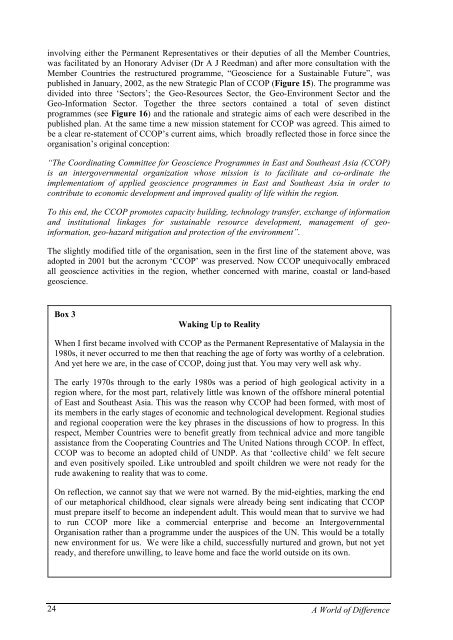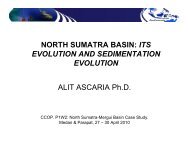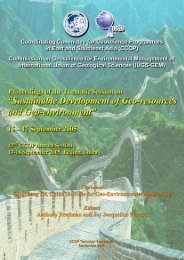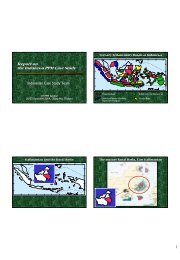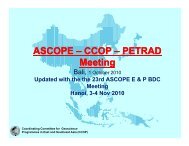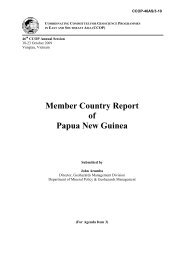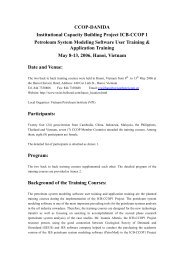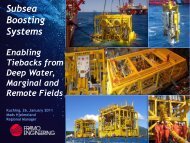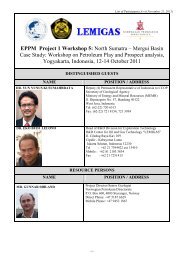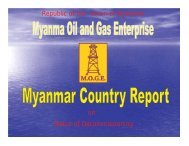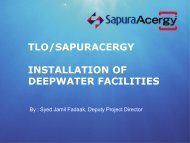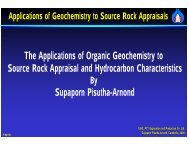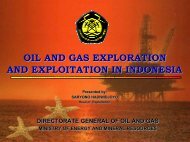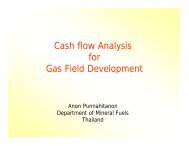Forty Years Of The Coordinating Committee For Geoscience - CCOP
Forty Years Of The Coordinating Committee For Geoscience - CCOP
Forty Years Of The Coordinating Committee For Geoscience - CCOP
You also want an ePaper? Increase the reach of your titles
YUMPU automatically turns print PDFs into web optimized ePapers that Google loves.
involving either the Permanent Representatives or their deputies of all the Member Countries,<br />
was facilitated by an Honorary Adviser (Dr A J Reedman) and after more consultation with the<br />
Member Countries the restructured programme, “<strong>Geoscience</strong> for a Sustainable Future”, was<br />
published in January, 2002, as the new Strategic Plan of <strong>CCOP</strong> (Figure 15). <strong>The</strong> programme was<br />
divided into three ‘Sectors’; the Geo-Resources Sector, the Geo-Environment Sector and the<br />
Geo-Information Sector. Together the three sectors contained a total of seven distinct<br />
programmes (see Figure 16) and the rationale and strategic aims of each were described in the<br />
published plan. At the same time a new mission statement for <strong>CCOP</strong> was agreed. This aimed to<br />
be a clear re-statement of <strong>CCOP</strong>’s current aims, which broadly reflected those in force since the<br />
organisation’s original conception:<br />
“<strong>The</strong> <strong>Coordinating</strong> <strong>Committee</strong> for <strong>Geoscience</strong> Programmes in East and Southeast Asia (<strong>CCOP</strong>)<br />
is an intergovernmental organization whose mission is to facilitate and co-ordinate the<br />
implementatiom of applied geoscience programmes in East and Southeast Asia in order to<br />
contribute to economic development and improved quality of life within the region.<br />
To this end, the <strong>CCOP</strong> promotes capacity building, technology transfer, exchange of information<br />
and institutional linkages for sustainable resource development, management of geoinformation,<br />
geo-hazard mitigation and protection of the environment”.<br />
<strong>The</strong> slightly modified title of the organisation, seen in the first line of the statement above, was<br />
adopted in 2001 but the acronym ‘<strong>CCOP</strong>’ was preserved. Now <strong>CCOP</strong> unequivocally embraced<br />
all geoscience activities in the region, whether concerned with marine, coastal or land-based<br />
geoscience.<br />
Box 3<br />
Waking Up to Reality<br />
When I first became involved with <strong>CCOP</strong> as the Permanent Representative of Malaysia in the<br />
1980s, it never occurred to me then that reaching the age of forty was worthy of a celebration.<br />
And yet here we are, in the case of <strong>CCOP</strong>, doing just that. You may very well ask why.<br />
<strong>The</strong> early 1970s through to the early 1980s was a period of high geological activity in a<br />
region where, for the most part, relatively little was known of the offshore mineral potential<br />
of East and Southeast Asia. This was the reason why <strong>CCOP</strong> had been formed, with most of<br />
its members in the early stages of economic and technological development. Regional studies<br />
and regional cooperation were the key phrases in the discussions of how to progress. In this<br />
respect, Member Countries were to benefit greatly from technical advice and more tangible<br />
assistance from the Cooperating Countries and <strong>The</strong> United Nations through <strong>CCOP</strong>. In effect,<br />
<strong>CCOP</strong> was to become an adopted child of UNDP. As that ‘collective child’ we felt secure<br />
and even positively spoiled. Like untroubled and spoilt children we were not ready for the<br />
rude awakening to reality that was to come.<br />
On reflection, we cannot say that we were not warned. By the mid-eighties, marking the end<br />
of our metaphorical childhood, clear signals were already being sent indicating that <strong>CCOP</strong><br />
must prepare itself to become an independent adult. This would mean that to survive we had<br />
to run <strong>CCOP</strong> more like a commercial enterprise and become an Intergovernmental<br />
Organisation rather than a programme under the auspices of the UN. This would be a totally<br />
new environment for us. We were like a child, successfully nurtured and grown, but not yet<br />
ready, and therefore unwilling, to leave home and face the world outside on its own.<br />
24<br />
A World of Difference


